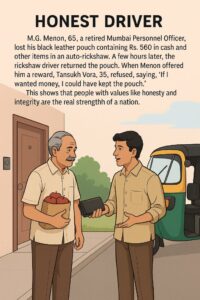SSLC English Question and Answer:Honest Driver
Looking for SSLC English Studies textbook answers? You can download Supplementary Chapter 3: Honest Driver Questions and Answers PDF, Notes, and Summary here. SSLC English 3rd Language solutions follow the Karnataka State Board Syllabus, making it easier for students to revise and score higher in exams.
Karnataka SSLC 3rd Language English Textbook Answers—Reflections Supplementary Chapter 3
Honest Driver Questions and Answers, Notes, and Summary
Class 10 3rd Language English Supplementary Chapter 2B
Honest Driver
Scroll Down to Download Honest Driver PDF
Comprehension I: Honest Driver
Question 1.
Is there any resemblance between Tansukh Vora’s father and Mohandas Karamchand Gandhi’s father?
Answer:
Yes, there is a resemblance between Tansukh Vora’s father and Mohandas Karamchand Gandhi’s father. Both fathers were strong advocates of honesty and moral values. Tansukh Vora’s father taught him that it was wrong to make money through unfair means, which deeply influenced Vora’s honest nature. Similarly, Gandhi’s father appreciated truthfulness and honesty, which had a lasting impact on young Gandhi’s character. Both fathers shaped their sons into men who valued integrity above material gain.
Question 2.
Develop a discussion in the backdrop of M.K. Gandhi telling his father, he did not copy the spelling of the word ‘kettle’ even though his teacher insisted him to copy.
Answer:
This incident reflects Gandhi’s deep commitment to truthfulness, even at a young age. When Gandhi was asked to copy the correct spelling of the word ‘kettle’ from his classmate during an inspection, he refused, even though it meant making a mistake. He later confessed to his father that he had not followed the teacher’s instruction because he believed it was wrong to cheat.
In the story “Honest Driver,” Tansukh Vora demonstrates a similar sense of integrity. Instead of keeping the pouch he found in his rickshaw, which contained money and important documents, he chose to return it to its rightful owner. His father had once guided him not to make money by unfair means, a principle that guided his actions.
Both incidents show how moral values taught at home play a significant role in shaping one’s character. Gandhi and Vora remained true to their conscience, even when no one was watching. Such values, when practiced by individuals, form the foundation of a strong and ethical society.
Additional Questions and Answers: Honest Driver
Question 3.
What did Menon lose, and how important was it to him?
Answer:
Menon lost a black leather pouch which contained Rs. 560 in cash, an important medical prescription, and duplicate keys to his apartment. It was very important to him because not only did it contain money, but also essential items for his health and home security.
Question 4.
What was Menon’s reaction when he realized his pouch was missing?
Answer:
Menon was very worried and disappointed. He rushed back to the fruit vendor hoping to find it there. He felt heartbroken, especially because his daughter had earlier lost a valuable bag in a similar situation and never recovered it.
Question 5.
How did Tansukh Vora trace Menon’s address?
Answer:
Tansukh Vora found Menon’s address inside the pouch. He used that information to personally return the pouch to Menon.
Question 6.
Why did Tansukh Vora refuse to accept the reward?
Answer:
Tansukh Vora refused the reward because he believed in honesty. He said, “If I wanted money, I could have kept the pouch.” This shows that his actions were driven by values, not by a desire for reward.
Question 7.
What lesson can we learn from Tansukh Vora’s actions?
Answer:
We learn the importance of honesty and integrity. Even when no one is watching, doing the right thing builds trust and strengthens the moral fabric of society. Vora’s actions remind us that a strong nation is built not only on wealth and power but also on values.
Question 8.
How did Vora’s father influence his character?
Answer:
Vora’s father had taught him that it is wrong to make money through unfair means. This lesson stayed with him throughout his life and shaped his honest behaviour, like returning the lost pouch without expecting anything in return.
“Honest Driver” Summary

The lesson “Honest Driver” is a real-life story that highlights the importance of honesty and moral values in everyday life. It tells the story of M.G. Menon, a 65-year-old retired personnel officer from Mumbai, who lost his black leather pouch in an auto-rickshaw. The pouch contained Rs. 560 in cash, a medical prescription, and duplicate keys to his apartment. Menon was very anxious, especially since his daughter had previously lost valuable jewellery and cash in a rickshaw and never got it back.
To his surprise, a few hours later, the auto-rickshaw driver, Tansukh Vora, returned to Menon’s house with the pouch. When Menon offered him a reward, Vora refused and said, “If I wanted money, I could have kept the pouch.” He shared how his father had once told him that it was wrong to earn money by dishonest means. That lesson stayed with him, and he always chose to do what was right.
This story beautifully shows that people like Tansukh Vora, who live by values such as honesty and integrity, are the real strength of a nation. It reminds us that a strong society is built not just through wealth or power, but through the actions of honest individuals.
